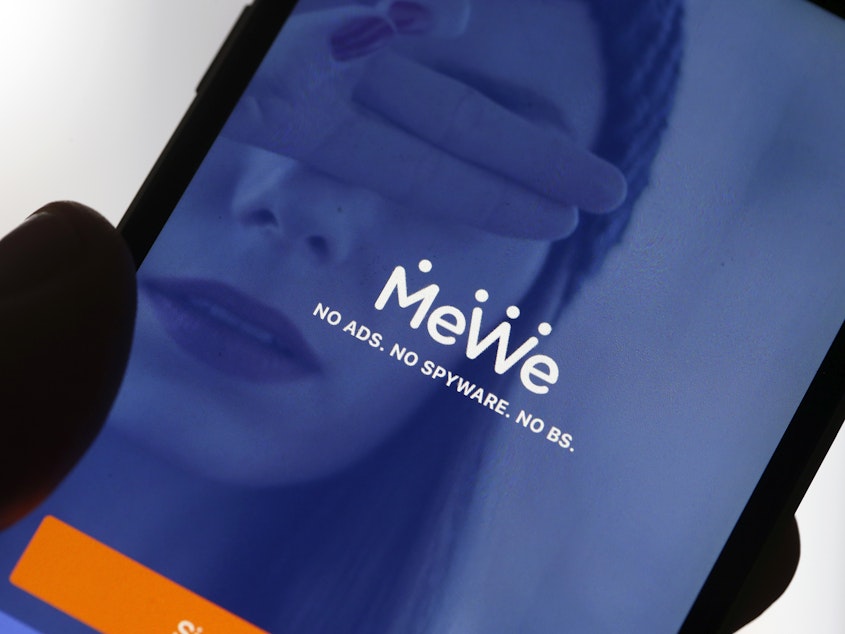Fast-Growing Alternative To Facebook, Twitter Finds Right-Wing Surge 'Messy'

The alternative social network MeWe had 12 million users at the end of 2020. Barely three weeks into 2021 — and two since a right-wing mob attacked the U.S. Capitol — the company says it's now passed 16 million.
CEO Mark Weinstein says this popularity is a testament to the reason he launched MeWe back in 2016 as an alternative to Facebook. MeWe markets itself as privacy forward. It doesn't harness users' data to sell ads or decide what content to show them.
"There's no targeting, there's no algorithm manipulating your news feed. No advertisers or marketers can reach or target you with anything," Weinstein said. Instead, MeWe makes money by selling subscriptions that give members extra features.
But privacy concerns aren't the only factor in MeWe's recent growth. It's one of a crop of digital upstarts — including the social network Gab and the messaging app Telegram — receiving an influx of former President Donald Trump's supporters who have grown disillusioned with mainstream social media.
"People are splintering off into these more fringe platforms that essentially have no content moderation or threat monitoring capability whatsoever," said Cindy Otis, a former CIA analyst who tracks disinformation at the Alethea Group.
Sponsored
Shortly after the Jan. 6 assault on the Capitol, Facebook and Twitter kicked off Trump and cracked down on groups involved in organizing the insurrection. By now, many of those users — and those who sympathize with them — have found alternative platforms on which to spread their messages.
Some groups Facebook banned for spreading false claims about election fraud and organizing "Stop the Steal" rallies sent their members to MeWe, Gab and Parler, another alternative social app. Parler recently went down after Amazon refused to host it, saying it had too much violent content.
MeWe's Weinstein resists the comparison to Parler or Gab, which tout themselves as free-speech sites. For one thing, he says, MeWe is serious about putting limits on what people can say.
"I don't like sites that are anything goes," Weinstein said. "I think they're disgusting. Good people right and left and middle can't handle 'anything goes.' We don't want to be around hate speech. We don't want to be around violence inciters."
Nor is MeWe meant to be a right-wing "echo chamber," the CEO said.
Sponsored
While MeWe does have rules, they are more lax than Facebook and Twitter. For example, both of the big platforms banned the baseless Qanon conspiracy theory because it has led to real-world violence, including at the Capitol. MeWe has not taken that blanket approach; it says it removes accounts and content that violate its rules against inciting violence, hate speech, harassment, bullying and illegal activity.
In fact, Weinstein accuses Facebook and Twitter of political censorship — a claim the companies deny,
And, despite MeWe's stated rules, journalists and researchers have found content on the site that defies them. The tech website OneZero uncovered right-wing militia groups on MeWe, as well as a "Stop the Steal" group that discussed shooting people. The company removed the groups after OneZero flagged them.
Weinstein acknowledged the surge of new members has strained MeWe's resources, but added: "Look, social media is messy. Some bad actors get in all over the place. Look at Facebook, look at Twitter ... I think we're much more nimble than they are."
He says the platform is hiring more moderators for the trust and safety team, currently under 100 people. MeWe recently changed its policies so that new groups must be approved by moderators before they can be listed in the social network's directory.
Sponsored
Weinstein also said that because MeWe doesn't use algorithms to boost certain posts that may be especially provocative, or accept advertising, it's harder for bad content — or any content — to go viral and spread unchecked.
"At MeWe, you can choose what page, what group, what opinion you choose to follow, but you have to search [for] it," he said. "No one can pay us to say, 'Hey, let's boost this false opinion.'"
But experts say all social networks have to get more serious about addressing harm, by setting clear rules about what behavior crosses the line, and enforcing those rules. That requires money and people — whether you've got MeWe's millions of users or Facebook's billions.
"I think we all still treat social media companies like they're these inexpensive startups, but maybe they need to be treated more like starting an airplane company or a company that makes cars," said Megan Squire, a professor at Elon University who studies online extremists. "You've got to think about seat belts."
For MeWe and other sites grappling with floods of new users, the question is: Are they willing — and able — to prevent online threats from turning into real-world harm?
Sponsored
"The risks are high," Squire said. "A Capitol insurrection, a riot, a siege is apparently the result if you don't take it seriously."
Editor's note: Facebook is among NPR's financial supporters. [Copyright 2021 NPR]



